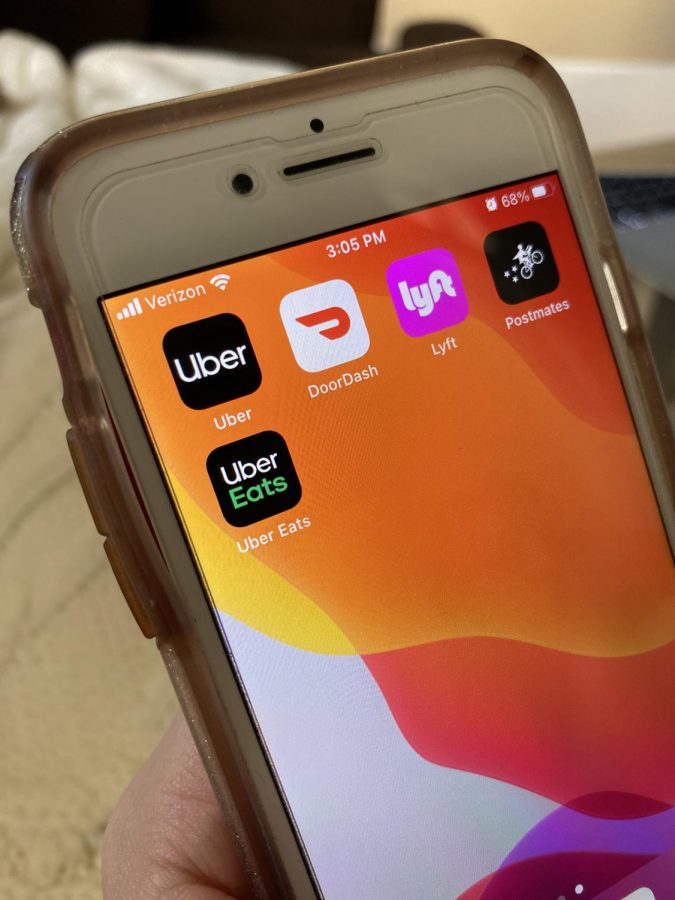Voting yes on Prop. 22 could save gig worker industry
Prop. 22 would protect app-based drivers’ status as independent contractors
Last year, California lawmakers introduced Assembly Bill 5, which would reclassify app-based gig drivers as employees rather than independent contractors. However, the companies that this law applies to—such as Lyft, Uber, Doordash, etc.—have yet to comply.
Since AB 5 would classify app-based drivers as employees, drivers would have to be offered minimum wage, paid sick leave, workers compensation, overtime and all of the typical benefits of an hourly wage job. Currently, these are expenses that these companies have been able to avoid by bringing their workers on as independent contractors.
While AB 5 has passed, the California appeals court granted an emergency stay, temporarily allowing services like Uber and Lyft to continue with their current pay model. Then, according to an article by CNBC, Lyft actually threatened to suspend its services in California, as AB 5 would require them to reconstruct their entire business model.
Enter Proposition 22, which is a counter to AB 5 and is on the ballot for the Nov. 3 election. If passed, Prop. 22 would protect app-based drivers’ status as gig workers, while still providing some additional benefits to drivers, according to the proposition’s website. The most notable of app-based rideshare and delivery services (Lyft, Uber, Doordash, Instacart, etc.) have invested millions of dollars in advertising revenue in order to support Prop. 22.
Detractors of Prop. 22 would most likely argue that app-based drivers aren’t being paid or protected enough, and are being exploited by the companies they drive for. On the surface, the benefits of AB 5 do sound nice and could be helpful, but those benefits would come at a cost.
According to an August 2019 blog post from Uber, the company suggests that AB 5 might require drivers to adhere to a schedule, just like an hourly employee would. As a Doordash driver myself, part of the appeal of the gig is not having to do it when I’m not available, or just simply don’t want to. I don’t have to call in or let somebody know that I won’t be working. I can also decide to take one or two deliveries, and then stop. AB 5 may not allow me to do that.
“We would likely have to exert more control over drivers, telling them where to work, how to work, and who they can work for,” according to Uber’s blog post. “Uber would likely hire far fewer drivers than we currently support, and we’d likely have to require a minimum number of hours per week. Scheduling and rigid shifts would become the norm, and Uber would likely prevent drivers from working for other rideshare companies.”
While I don’t work for Uber, it is very likely that Doordash and other companies like it will also have to exert more control over their drivers as well. Since I have an hourly job already, this probably wouldn’t work well with my schedule.
Personally, I consider my job as a Doordash driver and others like it to be a side gig, and nothing but that. Ideally, jobs like these are best to have in addition to an hourly job, that way you have a guaranteed source of income from your hourly wage, and bonus income depending on how many deliveries you take or how many people you pick up/drop off. But just relying on driving part-time to get by is probably not the best move.
Openings for app-based drivers may be harder to find under AB 5 as well, especially compared to now, where all you need for the most part is a working car and a clean background check. This would most likely create far less jobs for people during a time where we need them most.
And that’s if these services are even still available in California then. Since Lyft and Uber have threatened to leave the state, a failure of Prop. 22 could cost California hundreds of thousands of jobs. It also might cause food delivery services like Doordash to follow Lyft and Uber out of the state too, which would cost me my job as a delivery driver.
Since the beginning of the COVID-19 pandemic, I’ve seen an increase in delivery offers during my Doordash shifts, since people have been relying on deliveries and take-out more often. It would be a shame if I lost that source of income, as it has proven to be helpful for when I’m in a bind financially.
On the surface, the benefits of AB 5 seem nice, and I’m sure the people who wrote the bill and supported it, did so with the intention of protecting these drivers and getting them higher pay. But when you look at the facts, it turns out that this probably will not help app-based drivers very much, although I’m sure it could benefit some.












